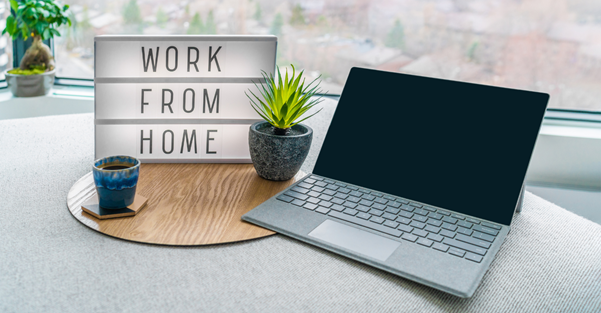
The proportion of people working from home more than doubled in 2020 during the Covid-19 pandemic and UK-wide lockdowns according to official figures.
The (ONS) said about a quarter of people (25.9%) or 8.4 million people had worked from home at some point in the week before they responded to officials conducting their annual population survey. According to ONS, this compared with 12.4% of workers in 2019.
That was a time when covid-19 was yet to emerge in Europe though the ramifications of the unique public health emergency have since sparked debate over the future of the workplace as we know it.
Those who were placed on furlough last year – almost nine million people, during April and May 2020, were not included in the survey. This is because they were not able to work under eligibility rules for the Job Retention Scheme.
If you worked from home for some or all of last year, you may be entitled to Work From Home Tax Relief from the HMRC. In this Guide, we break it all down for you:
What is the HMRC Working From Home Tax Relief And Who Is Entitled To it?
HMRC received more than 3 million claims for this tax relief for the 2020 to 2021 tax year.
Myrtle Lloyd, HMRC’s Director General for Customer Services, said: “Half a million people have already reduced their Income Tax this year by up to £125, by claiming tax relief on their working from home expenses. We want everyone who is eligible to benefit.”
How Much Tax Relief Can You Claim As a Result of This Rebate Scheme?
From 6 April 2020, the amount employers have been able to pay tax-free without employees having to provide evidence of an increased bill is up to £6 a week. Employees who have not received the working from home expenses payment direct from their employer can apply to receive the tax relief from HMRC.
Eligible customers can claim tax relief based on the rate at which they pay tax. For example, if an employed worker pays the 20% basic rate of tax and claims tax relief on £6 a week, they will receive £1.20 a week in tax relief (20% of £6 a week) towards the cost of their household bills.
Higher rate taxpayers would receive £2.40 a week (40% of £6 a week). Over the course of the year, this could mean customers can reduce the tax they pay by £62.40 or £124.80 respectively.
If employees were required to work from home last year but did not claim for the tax relief, they have not missed out; HMRC will accept backdated claims for up to 4 years. They will receive a lump sum payment for any successful backdated claims.
If a couple both work from home, can they both claim Work From Home Tax Rebate?
The HMRC working-from-home tax relief is an individual benefit. So if you’ve had an increase in costs because you’re required to work from home, you can both claim it.
If you are a couple or a group of flatmates living in the same property, and you’re all required to work from home, and its fair to say that household costs have increased specifically from each individual working from home, you can all claim it.
Can University Students, Studying From Home, Claim Any Rebate From Universities To Offset Their Expenses?
Ultimately, students have no more right to a rent reduction or payment freeze than any other private renter – and this applies to those renting both university-provided accommodation and private housing, but some universities have confirmed they will provide rent refunds or discounts, and as they have a pastoral duty of care for their students. You may find they’re more likely to offer help than private landlords.
- Check if your university has a refund policy in place. There’s no legal requirement on university – to give your money back, although Prime Minister Boris Johnson did state in January 2021 that the Government in England “will have a look” at uni accommodation costs to ensure students are being treated fairly.
- Check your tenancy agreement. If your uni initially says no, check your tenancy agreement to make sure there is no get-out clause. It’s unlikely, but look to see if your tenancy agreement includes any clauses on when you may be entitled to a rent rebate or discount for any time you can’t spend on accommodation.
- Lobby your university or student union. If your uni has no policy in place and there’s no provision for a refund in your contract, it might be possible to argue that your contract has been “frustrated” – ie, it is impossible to perform if you can’t access your accommodation because it is impossible or illegal to travel. That’s because the Competition and Markets Authority’s (CMA) views on consumer protection law also apply to higher education providers.
Unite Students announces rent discount on 11 January 2021 and Student Roost have confirmed they will offer rent refunds to students unable to return to university.
Interestingly, In January 2021, Unite Students, one of UK’s largest developer of purpose-built student accommodations (PBSA), announced a rent discount for University students. This was following the Government’s Covid-19 lockdown announcement.
Does the Work From Home HMRC Rebate Apply To Part-Time Employees Who Don’t Pay Tax But May Be Working From Home?
As this is a tax rebate, you need to pay tax in the tax year you are claiming for, to be able to claim it back.
The current threshold for the 2021-22 tax year is £12,570, which means you need to earn above £12,570 in an individual tax year before tax is deducted from your salary.
What Are Important Dates For Claiming The Work From Home Tax Rebate?
During the 2020 lockdown, HM Revenue & Customs (HMRC) launched a ‘microservice‘ which, even if you only needed to work from home for a day, allowed you to get a WHOLE year’s tax relief.
That now applies for the new 2021/22 tax year too – meaning many people are due TWO years’ relief, worth up to £280.
As HMRC allows taxpayers up to 4 years to claim back any tax they are owed, you have until April 2025 to claim the work from home tax rebate. As Tax Advisors, we recommend claiming this rebate as soon as possible.
If you’ve already claimed for 2020/21, you MUST CLAIM AGAIN for 2021/22 tax year, via the same microservice (you won’t be shown the box for last year, just this year).
Relief for the current tax year will be paid via a change in your tax code. This is what tells your employer how much tax to take. The result will be less tax taken off each month for the rest of the year.

Only required to work from home part-time? You can still claim
Many offices and places of work have been reopening (and closing, and reopening…), but to ensure they are Covid safe, fewer employees can go into the premises at any one time.
Often this is done by allowing different employees to come in on different days, and stay at home on the rest.
HMRC has confirmed that as long as you are required to work from home and have additional expenses due to it, even if…
– It is only working from home part-time
– Others are going into work
– You are only needed to work from home, say, one day in five, and were in the office the rest of the week.
For all of the above situations, you can claim the full year’s allowance.

For claims before 23 March 2020, you don't automatically get the whole tax year
But here, unlike this tax year, you should only claim tax relief for the weeks you were working from home, not the whole year.
The criteria applied when accepting these claims are likely to be far more strict.
To do this, complete the online P87 form or postal P87 form – there’s help in the ‘Already made a claim?’ section above.
If you’ve been working from home for longer, you can claim back up to four years, ie, to April 2017 – do a separate form for each tax year.
How can you claim tax relief for working from home?
First, you’ll need to check whether you’re eligible to receive tax relief for working from home. To claim, you must:
Only be claiming for expenses for working from home (other expenses must be claimed differently)
- Not pay tax by self-assessment (as you’ll have to claim via your next tax return).
- Not have already had your expenses paid by your employer
- Have started working from home due to the coronavirus pandemic
- Have encountered higher costs due to working from home.
If all of these apply to you, then you can head to the government’s microsite where its eligibility tool will check all of the facts.
You’ll need a Government Gateway user ID and password to proceed, but if you don’t already have one you’ll be guided to the right place to make one.
Once you’re logged in, you’ll need to state what date you started working from home. You’ll receive a rebate for the full tax year, even if you don’t know what date you’ll be going back to the office – and even if you’ve only worked from home for one day.
If your claim is successful, your PAYE tax code will be changed, so you’ll be able to take home more of your income before tax.
How Do I Claim The Work From Home Tax Rebate If I Am Self Employed?
To work out the proportion, you’ll need to account for the amount of time you’re using your home for work, and in some cases the size of the area within the home that’s used for work purposes. For example, if you work in a study you’d only be able to claim for the costs of heating that room while you work.
If you work from home for more than 25 hours a week, you might be able to use HMRC’s simplified expenses system.
You can only claim expenses via a self-assessment tax return, which you have to submit to declare your earnings each year anyway.
Expenses incurred from working from home can be deducted from your profits, which will reduce your overall tax bill.


